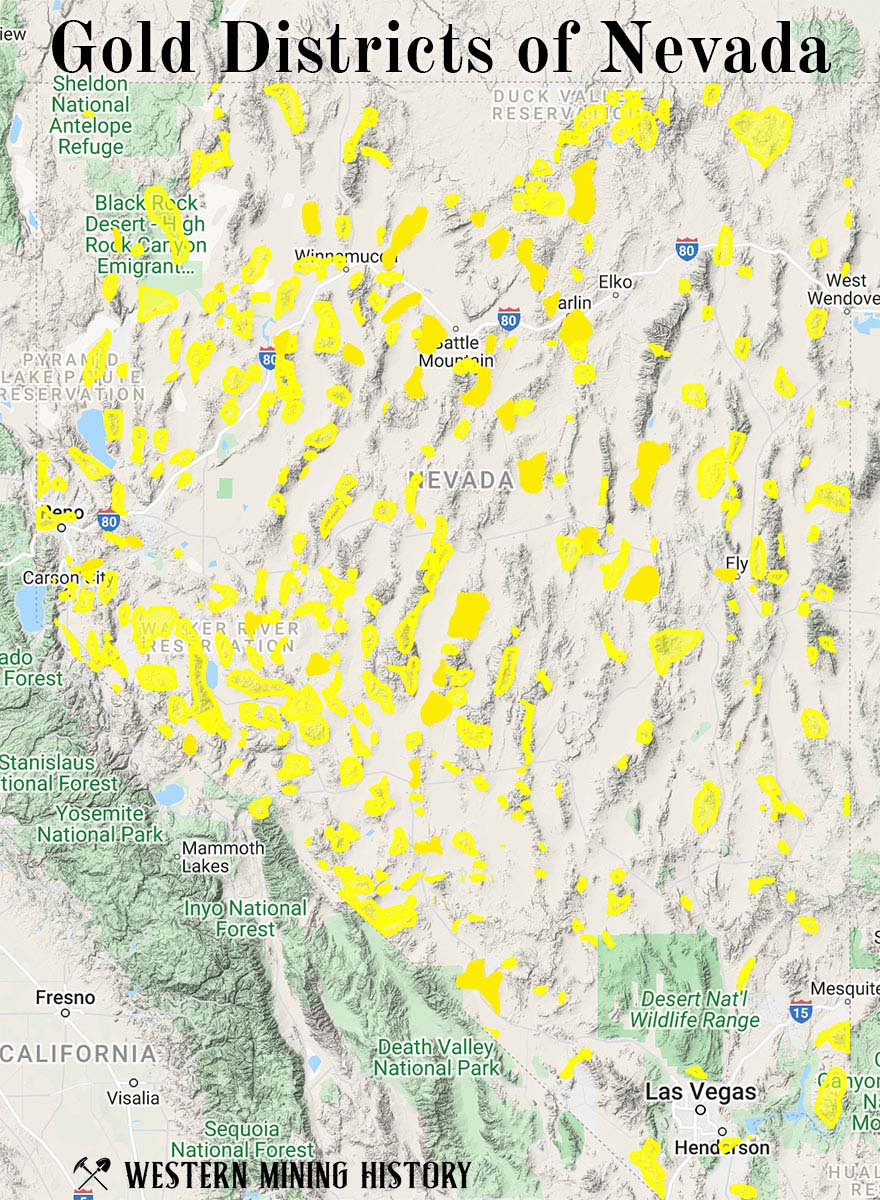The Afgan Deposit is a gold mine located in Eureka county, Nevada.
About the MRDS Data:
All mine locations were obtained from the USGS Mineral Resources Data System. The locations and other information in this database have not been verified for accuracy. It should be assumed that all mines are on private property.
Mine Info
Afgan Deposit MRDS details
Site Name
Primary: Afgan Deposit
Secondary: Afghan deposit
Commodity
Primary: Gold
Location
State: Nevada
County: Eureka
District: Antelope District
Land Status
Land ownership: BLM Administrative Area
Note: the land ownership field only identifies whether the area the mine is in is generally on public lands like Forest Service or BLM land, or if it is in an area that is generally private property. It does not definitively identify property status, nor does it indicate claim status or whether an area is open to prospecting. Always respect private property.
Administrative Organization: Battle Mountain BLM District
Holdings
Not available
Workings
Not available
Ownership
Owner Name: White Knight Resources, Ltd.
Info Year: 2001
Production
Not available
Deposit
Record Type: Site
Operation Category: Prospect
Deposit Type: disseminated
Operation Type: Surface
Years of Production:
Organization:
Significant: Y
Deposit Size: S
Physiography
Not available
Mineral Deposit Model
Model Name: Sediment-hosted Au
Orebody
Form: disseminated
Structure
Type: L
Description: Paleozoic thrusting and folding and Tertiary age high angle faulting have affected rocks in the mine area. Limestone beds are gently folded along ENE-trending fold axes, forming anticlines and synclines that plunge 10-40 degrees to the east. The dominant Tertiary fault sets strike northwest and north-south; other sets strike east-northeast and northeast.
Type: R
Description: The deposit is located in a window of lower plate rocks below the Roberts Mountain Thrust and lying along the NW-trending Battle Mountain-Eureka Trend of mineral deposits.
Alterations
Alteration Type: L
Alteration Text: Mineralization is closely associated with major decalcification and to a lesser extent with silicification of host rocks and jasperoid development along high-angle structures. Also evident is remobilization of carbon and oxidation and redistribution. Minor bleaching, calcite veining, argillization. All alteration types occur mainly up dip from the feeder structure. The oxidation of pyrite and subsequent remobilization of iron oxides have produced spectacular brick-red to dark yellow brown banding in the oxidized, decalcified limestone. In many areas the ore exhibits intense liesegang banding. Most of the calcite veining is characterized by 0.1-30 cm veins located up dip from the orebody. Argillization is rare. Illitic clays have been locally altered to montmorillonite and allophane.
Rocks
Role: Host
Age Type: Host Rock Unit
Age Young: Early Mississippian
Analytical Data
Not available
Materials
Ore: Gold
Comments
Comment (Commodity): Ore Materials: NATIVE GOLD
Comment (Development): Still in exploration phase, 1999. In 2005 Castleworth as announced significant resources at two of its projects, Pan and Afgan, both located in the Battle Mountain-Cortez Trend.
Comment (Economic Factors): Reserves were reported in 1997 as 1600 Kilotonnes grading 2.9 g/t gold. Reserves in 1999 were reported as 2.8 million tons of oxide ore grading 0.037 opt Au. In 2005, the Afgan Project was estimated to contain a resource of 1.85 million tons at a grade of 0.027 opt Au (Indicated), and 1.29 million tons at a grade of 0.026 opt Au (Inferred).
Comment (Location): The deposit is located on the south flank of the Roberts Mountains.
Comment (Workings): The deposit is developed by drill roads and pads.
References
Reference (Deposit): Geology and Mineralization of the Gold Bar District, Southern Roberts Mountains, Eureka County, Nevada, 1998, French, G.M., Fenne, F.K., Maus, D.A., Rennebaum, T.D., and Jennings, T.A., in Sediment-hosted Gold Deposits of the Eureka (Ruby Hill Mine) and Gold Bar Districts, East-Central Nevada, Geological Society of Nevada Special Publication No., 27, 1998 Spring Field Trip Guidebook.
Reference (Deposit): Long, K.R., DeYoung, J.H., Jr., and Ludington, S.D., 1998, Significant deposits of gold, silver, copper, lead, and zinc in the United States: U.S. Geological Survey Open-File Report 90-206A, 33 p.; 98-206B. one 3.5 inch diskette.
Reference (Deposit): NBMG MI-96 thru MI-99
Reference (Deposit): Simpson Park Mtns. Land Status, 1979
Reference (Deposit): Amer. Mines (2000), 1999
Reference (Deposit): Amer. Mines (2001) 2000
Reference (Deposit): Maher, 1997
Reference (Deposit): Castleworth (Pan Nevada) website, Feb. 2006.
Reference (Deposit): BLM Claim Microfiche, 1997
Nevada Gold

Nevada has a total of 368 distinct gold districts. Of the of those, just 36 are major producers with production and/or reserves of over 1,000,000 ounces, 49 have production and/or reserves of over 100,000 ounces, with the rest having less than 100,000 ounces. Read more: Gold Districts of Nevada.